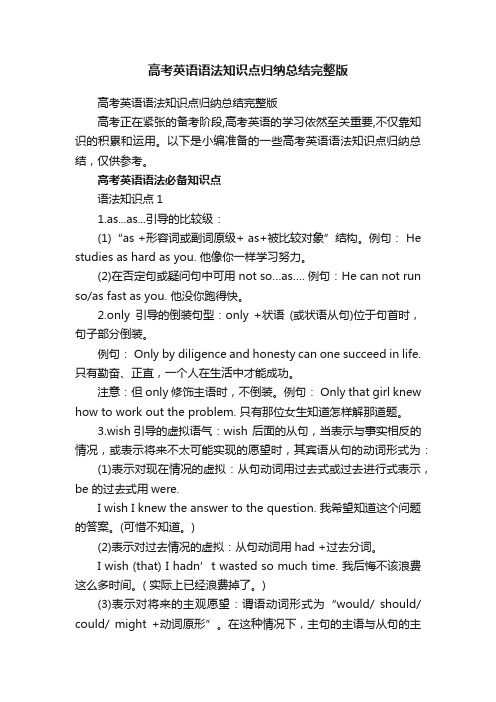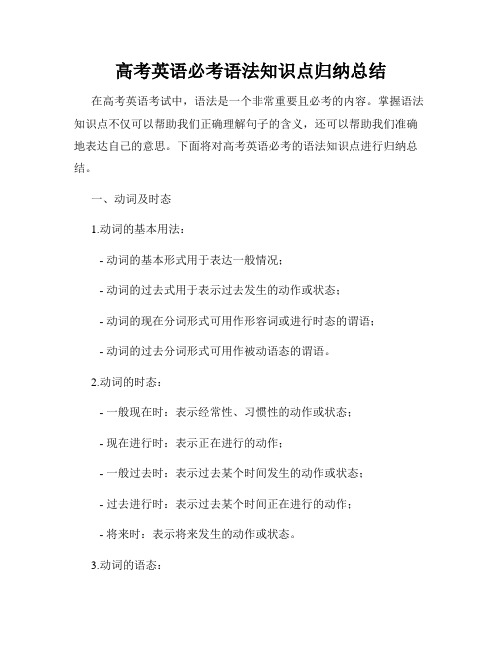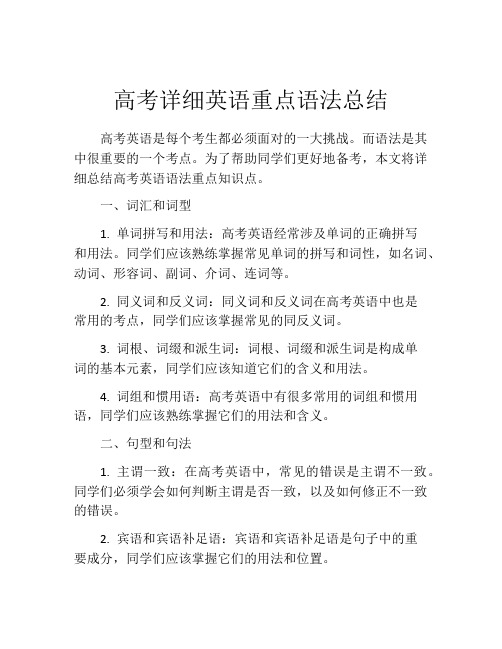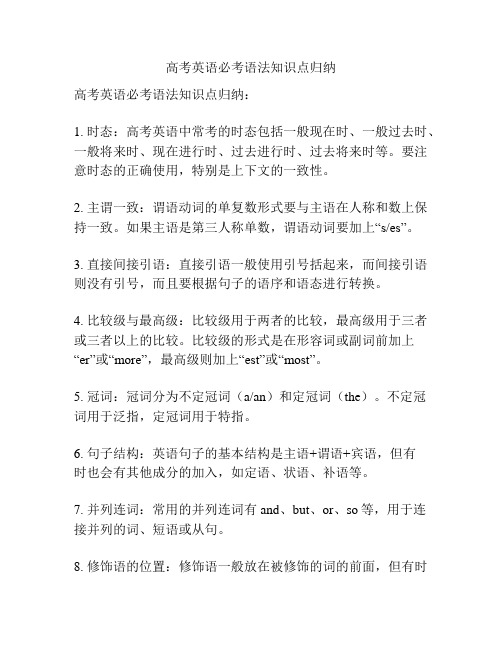2019-2020年高考英语语法专题复习讲义必备句型全归纳(最新整理)
2019-2020学年度最新高考英语语法复习专题Word版

2019-2020学年度最新高考英语语法复习专题Word版(附参照答案 )1、名词性从句中连结词的运用名词性从句中的连结词有连词 that / whether / as if ,连结代词 what / who/ which / whose / whatever/ whoever / whomever / whichever ,连结副词 where / when / why / how / wherever / whenever。
(1) that 的用法。
①主语从句、表语从句、同位语从句顶用that 但不可以省略。
如:That they are good at English is known to us all.The problem is that we don’ t have enough money.②宾语从句中的连结词that 有时可省有时又不行省,在以下几种状况中that 不可以省略:( A )当 that 从句和主句谓语动词之间有插入词语或许从句主语之间有插入语时,that 不行省略;(B )当 that 从句与另一名词性从句并列作宾语时, that 不可以省;( C)当 that 作介词宾语时,that 不行免却。
如:He judged that,because he was a child, he did not understand wineEveryone knew what happened and that she was worried.The reason lies in that she works harder than the others do.③that 从句作主语和宾语时,能够用it 来替代成以下几种构造表达。
(A)It is clear/certain/likely/true/surpris ing that(B)It is a pity/shame/good idea/no wonder that ...( C)It is said/reported/ believed/known/thought/suggested that(D)It seems/happens that。
2019-2020年高考英语句型句式专题汇总[共39页]
![2019-2020年高考英语句型句式专题汇总[共39页]](https://img.taocdn.com/s3/m/a9086d664a7302768f99396e.png)
2019-2020年高考英语句型句式专题汇总[共39页](一)按使用目的可分为陈述句、疑问句、祈使句和感叹句。
1)陈述句(Declarative Sentences):说明一个事实或陈述一种看法。
Light travels faster than sound.光比声速度快。
(说明事实)The film is rather boring.这部电影很乏味。
(说明看法)这里我们侧重讲述否定句一.概念否定句指否定陈述句的句子.二.相关知识点精讲1.用not构成的否定句:主语+助动词/ be+not+…例句:He is not back yet.It is not true.We haven’t forgotten you.You shouldn’t be so silly.We haven’t been invited yet.He won’t go, but they will.Money could not buy happiness.I like the salad, but I don’t like this soup.He wants a gir l friend, but he doesn’t want to get married.You didn’t understand what I said, did you ?You needn’t try to explain.I didn’t use to like opera, but now I’m getting interested.I usedn’t to like opera, but now I’m getting interested.2.祈使句的否定句:Don’t+动词原形…。
例句:Don’t worry. I’ll look after you.Don’t believe a word he says.Don’t be so rude.3. 非谓语动词(不定式,分词,动名词)的否定式:把not放在to do; doing; 的前面。
2019-2020学年度最新高考英语语法专题复习Word版

2019-2020学年度最新高考英语语法专题复习Word版( 附参照答案 )一、冠词The Article知识重点:冠词是一种虚词,放在名词的前面,帮助说明名词的含义。
冠词分不定冠词(The Indefinite Article)和定冠词( The definite Article )两种。
a (an) 是不定冠词, a 用在辅音以前:如 a book, a man; an 用在元音以前,如: an old man, an hour, an interesting book 等。
the 是定冠词。
一、不定冠词的用法1、指人或事物的某一种类(泛指)。
这是不定冠词a (an)的基本用法。
如:She is a girl. I am a teacher. Please pass me an apple.2、指某人或某物,但不详细说明何人或何物。
如:He borrowed a story-book from the library.A Wang is looking for you.一位姓王的同志正在找你。
3、表示数目,有“一”的意思,但数的观点没有one 激烈。
如:I have a mouth, a nose and two eyes.4、用于某些固定词组中。
如:a bit, a few, a little, a lot of, a piece of, a cup of, a glass of, a pile of, a pair of, have a good time, for a while,for a long time 等。
5、用在抽象名词前,表详细的介绍——a +抽象名词,起详细化的作用。
如:This little girl is a joy to her parents.这女孩对她父亲母亲来说是一个乐趣。
It is a pleasure to talk with you.跟您谈话真是一件快乐的事情。
2019-2020年高考英语语法专题复习讲义阅读必备资料

2019-2020年高考英语语法专题复习讲义阅读必备资料一.文章的套路结构:(本笔记局限于说明文章,议论文章。
)1. 结论说明型A.文章开始出现一个结论,后为对他的解释B.TS(topical sentence即主题句)即为为结论出现支出;注意特别容易的情况是每一段之主题句是该段首句。
C.什么是“判断句”?---通常很重要,判断结论说明型靠判断句,直指主题a.系表结构:be. remainb.含有作者的态度和评价,注意可能有自由褒贬词2.新老观点型A.判断标志:文章开始不久就出现了老观点,例如:it was traditionally assumed?it was once / usually believed?Many ××believed that?Many ××have argued?It was frequently assumed that?It was universally accepted that?过去.传统.大家一致公认的观点,都是老观点。
B.TS:陈述新观点的句子。
C.新观点特征:对同一focus给出不同的解释。
读到老观点的时候,应该停下来想一想,新观点可能是什么样子,从而往下有目的地寻找。
3.现象解释型A.判断标志:首段给出一个自然的或社会的现象,往往很古怪,下文对其做出解释。
B.可能有多种解释,TS:作者给了正评价的解释。
C.需要注意的是:a.可能先给出几个错误的(作者持负评价),最后一个才是正确的(正平价)。
b.可能所有解释作者全都不喜欢。
4.问题解决.回答型A.判断标志:a.手段出现了设问句。
b.首段出现了以下词语:problem difficulty task puzzle 等B.TS:作者给出正评价的解决方案。
5.其他类的文章前班部分是以上四种结构之一,后半部分讲了一些与前面无关的内容。
TS在前面,从前面不从后面二.做题的几条原则1.先读文章后做题也可以先看题在看文章,建议仔细看全文,才能把握主题不至于上当2.不能凭印象,或自己的知识背景做题。
高考英语语法知识点归纳总结完整版

高考英语语法知识点归纳总结完整版高考英语语法知识点归纳总结完整版高考正在紧张的备考阶段,高考英语的学习依然至关重要,不仅靠知识的积累和运用。
以下是小编准备的一些高考英语语法知识点归纳总结,仅供参考。
高考英语语法必备知识点语法知识点11.as...as...引导的比较级:(1)“as +形容词或副词原级+ as+被比较对象”结构。
例句: He studies as hard as you. 他像你一样学习努力。
(2)在否定句或疑问句中可用not so…as…. 例句:He can not run so/as fast as you. 他没你跑得快。
2.only引导的倒装句型:only +状语(或状语从句)位于句首时,句子部分倒装。
例句: Only by diligence and honesty can one succeed in life. 只有勤奋、正直,一个人在生活中才能成功。
注意:但 only修饰主语时,不倒装。
例句: Only that girl knew how to work out the problem. 只有那位女生知道怎样解那道题。
3.wish引导的虚拟语气:wish 后面的从句,当表示与事实相反的情况,或表示将来不太可能实现的愿望时,其宾语从句的动词形式为:(1)表示对现在情况的虚拟:从句动词用过去式或过去进行式表示,be 的过去式用were.I wish I knew the answer to the question. 我希望知道这个问题的答案。
(可惜不知道。
)(2)表示对过去情况的虚拟:从句动词用had +过去分词。
I wish (that) I hadn’t wasted so much time. 我后悔不该浪费这么多时间。
( 实际上已经浪费掉了。
)(3)表示对将来的主观愿望:谓语动词形式为“would/ should/ could/ might +动词原形”。
高考英语必考语法知识点归纳总结

高考英语必考语法知识点归纳总结在高考英语考试中,语法是一个非常重要且必考的内容。
掌握语法知识点不仅可以帮助我们正确理解句子的含义,还可以帮助我们准确地表达自己的意思。
下面将对高考英语必考的语法知识点进行归纳总结。
一、动词及时态1.动词的基本用法:- 动词的基本形式用于表达一般情况;- 动词的过去式用于表示过去发生的动作或状态;- 动词的现在分词形式可用作形容词或进行时态的谓语;- 动词的过去分词形式可用作被动语态的谓语。
2.动词的时态:- 一般现在时:表示经常性、习惯性的动作或状态;- 现在进行时:表示正在进行的动作;- 一般过去时:表示过去某个时间发生的动作或状态;- 过去进行时:表示过去某个时间正在进行的动作;- 将来时:表示将来发生的动作或状态。
3.动词的语态:- 主动语态:表示主语进行或完成动作;- 被动语态:表示主语接受动作。
二、代词1.人称代词:- 主格代词用作主语;- 宾格代词用作宾语或介词的宾语;- 形容词性物主代词用于修饰名词;- 名词性物主代词在句中充当名词的作用;- 反身代词表示动作的主体同时也是动作的承受者。
2.指示代词:- 指示代词可用于指示距离的远近或在句中代替特定的事物。
3.不定代词:- 不定代词用于代替不确定或泛指的人或事物。
三、形容词和副词1.形容词:- 形容词修饰名词,用于描述或限定名词。
2.副词:- 副词修饰动词、形容词或其他副词,用于描述或限定动作的方式、程度等。
四、句型和从句1.简单句:- 简单句由主语和谓语构成,能够独立表达一个完整的意思。
2.并列句:- 并列句由两个或多个独立的分句组成,各分句之间用连词连接。
3.复合句:- 复合句包括一个主句和一个或多个从句。
4.定语从句:- 定语从句用来修饰一个名词或代词,并且不能独立成句。
5.名词性从句:- 名词性从句可以在句子中充当主语、宾语或表语。
五、形式和语气1.直接引语和间接引语:- 直接引语是原话的直接陈述或引述;- 间接引语是对原话的复述或改写。
高考详细英语重点语法总结

高考详细英语重点语法总结高考英语是每个考生都必须面对的一大挑战。
而语法是其中很重要的一个考点。
为了帮助同学们更好地备考,本文将详细总结高考英语语法重点知识点。
一、词汇和词型1. 单词拼写和用法:高考英语经常涉及单词的正确拼写和用法。
同学们应该熟练掌握常见单词的拼写和词性,如名词、动词、形容词、副词、介词、连词等。
2. 同义词和反义词:同义词和反义词在高考英语中也是常用的考点,同学们应该掌握常见的同反义词。
3. 词根、词缀和派生词:词根、词缀和派生词是构成单词的基本元素,同学们应该知道它们的含义和用法。
4. 词组和惯用语:高考英语中有很多常用的词组和惯用语,同学们应该熟练掌握它们的用法和含义。
二、句型和句法1. 主谓一致:在高考英语中,常见的错误是主谓不一致。
同学们必须学会如何判断主谓是否一致,以及如何修正不一致的错误。
2. 宾语和宾语补足语:宾语和宾语补足语是句子中的重要成分,同学们应该掌握它们的用法和位置。
3. 从句和关系词:从句是复合句中的一个重要部分,关系词是从句中的重要元素。
同学们必须学会如何构造和使用从句和关系词。
4. 并列句和复合句:并列句和复合句是高考英语中常用的句型。
同学们必须学会如何判断和修正错误,并熟练使用这些句型。
三、时态和语态1. 时态和语态的基本概念:在高考英语中,时态和语态是重要的考点。
同学们应该熟练掌握各种时态和语态的基本概念和用法。
2. 时态的转换:同学们还应该掌握时态的转换,如将直接引语改为间接引语时,要将时态与语气作相应调整。
3. 语态的转换:在高考英语中,同学们还必须学会语态的转换,如将主动语态变为被动语态,或将被动语态变为主动语态。
四、虚拟语气和语气1. 虚拟语气的基本概念:虚拟语气是高考英语中难点之一。
同学们必须掌握虚拟语气的基本概念和用法。
2. “should”用法:在虚拟语气中,“should”是重要的标志词之一。
同学们应该熟练掌握它的用法和位置。
3. 语气的变化和转换:语气在高考英语中也是重要的考点。
高考英语必考语法知识点归纳

高考英语必考语法知识点归纳高考英语必考语法知识点归纳:1. 时态:高考英语中常考的时态包括一般现在时、一般过去时、一般将来时、现在进行时、过去进行时、过去将来时等。
要注意时态的正确使用,特别是上下文的一致性。
2. 主谓一致:谓语动词的单复数形式要与主语在人称和数上保持一致。
如果主语是第三人称单数,谓语动词要加上“s/es”。
3. 直接间接引语:直接引语一般使用引号括起来,而间接引语则没有引号,而且要根据句子的语序和语态进行转换。
4. 比较级与最高级:比较级用于两者的比较,最高级用于三者或三者以上的比较。
比较级的形式是在形容词或副词前加上“er”或“more”,最高级则加上“est”或“most”。
5. 冠词:冠词分为不定冠词(a/an)和定冠词(the)。
不定冠词用于泛指,定冠词用于特指。
6. 句子结构:英语句子的基本结构是主语+谓语+宾语,但有时也会有其他成分的加入,如定语、状语、补语等。
7. 并列连词:常用的并列连词有and、but、or、so等,用于连接并列的词、短语或从句。
8. 修饰语的位置:修饰语一般放在被修饰的词的前面,但有时也可以放在后面。
要注意修饰语的位置对句子意思的影响。
9. 名词性从句:名词性从句可以充当名词的作用,包括主语从句、宾语从句、表语从句和同位语从句等。
10. 非谓语动词:非谓语动词包括动词不定式、动名词和分词。
它们可以在句子中作主语、宾语或定语等。
以上是高考英语常见的必考语法知识点归纳,希望对你备考有帮助。
记住这些知识点,多做练习题,提高语法应用能力。
高考英语必考语法知识点归纳11. 主语从句(Subject Clauses):主语从句用于作为句子的主语,常由连接词that引导。
例如:That he has won the game is beyond doubt.(他赢得比赛毫无疑问)12. 宾语从句(Object Clauses):宾语从句用作句子的宾语,常由连接词that引导。
- 1、下载文档前请自行甄别文档内容的完整性,平台不提供额外的编辑、内容补充、找答案等附加服务。
- 2、"仅部分预览"的文档,不可在线预览部分如存在完整性等问题,可反馈申请退款(可完整预览的文档不适用该条件!)。
- 3、如文档侵犯您的权益,请联系客服反馈,我们会尽快为您处理(人工客服工作时间:9:00-18:30)。
2019-2020年高考英语语法专题复习讲义必备句型全归纳1.as soon as…一…就…= directly / immediately / instantly… = the second / the minute / the moment / the instant… Eg. He came around to see me as soon as / the moment/ immediately he checked in the hotel.他刚一入住宾馆就来看我. They informed us the news immediately / directly they got it.他们一得到消息就通知了我们. The policeman came to the spot the moment / the instant / the minute she heard of the accident.一听说事故,这位警察就到了现场. 2.….before…. (1). 没来得及…就… The roof fell before he had time to dash into the room to save his baby. 他还没有来得及冲进房间把孩子就出来,房顶就塌了. He ran off before I could stop him. To my great disappointment , my favorite singer left the concert before I could havea word with him. (2).过了多久才怎么样,动作进行到什么程度才怎样 They walked about thirty miles to the west before they saw a village. They worked day and night about three days before everything returned to normal. Three years passed before I knew it. 3.It was + 时间段+ before….过了多久才…. ; It was not long before…不久就… It will ( not ) be + 时间段+ before …要过多久( 不久)…..才….. Eg. It was not long before he sensed the danger of the position. It was three years before he came back. It will be half a year before you graduate from this school. 4. no sooner …than…= hardly…when…一…就…., 刚刚…就… No sooner / hardly + 过去完成时,than / when + 一般过去时 如果no sooner, hardly 位于句首, 主句要倒装. He had hardly sat down to have a rest when the door bell rang and in came Allan. No sooner had he got off the train than his daughter ran towards him. Hardly had we arrived when she started crying to go home. 5. once 一旦…., 表示时间和条件 Once you understand this rule, you will have no further difficulty. Once you have decided to do something, you should do it well. Once you enter the chemistry lab, you should follow the teacher’s instructions. 6. since …自从….以来 Since 引导的从句不论是延续性或非延续性动词, 都表示的是动作或状态的完成或结束. 注意一下句子翻译: Since he lived in Nanjing, I have not heard from him. (= since he left Nanjing…) 自从他离开南京以来,我没有收到过他的信. Since she was in Yangzhou, she has kept in touch with her former friends. ( since she left Yangzhou…) 她离开扬州以来,一直同过去的朋友保持着联系. 对比: 1). I have never seen him since he was ill. 他病好后,我就再也没有见到他. 2). I have never seen him since he fell ill. 他生病以后我就再也没有见过他. It is / ( has been ) + 时间段+ since + 过去式 It is / has been two years since his father died. = his father has been dead for two years. = his father died two years ago. 他的父亲去世两年了. It has been 8 years since I graduated from university. = I graduated from university 8 years ago. It is 3 years since he smoked. 他三年不吸烟了.(即,从句动词延续性的,译成否定意义;从句动词非延续性的,译成肯定意义.) It is 3 years since he left school.-----他毕业三年了. 7….until…直到…时候; not…until…直到…才… You are to stay here until / till your mother es back. The meeting was put off until ten o’clock. Not until we watched the Earth Day program on TV did we know much about global warning. = We did not know much about global warning until we watched the Earth Day program. = It was not until we watched the Earth Day program on TV that we knew much about global warming. Not until he failed in the exam did he realize that he had wasted much time playing puter games. 8. …when…引导并列分句, “当时,突然”,强调另一动作的突然发生. One day Chuck was on a flight across the Pacific Ocean when suddenly his plane crashed. Chuck survived the crash and landed on a deserted island. I was walking along the river when I heard a drowning boy crying for help. I was about to leave when it began to rain. 对比: A: I was walking along the street when I caught sight of a tailor’s shop. B: I was walking along the streets. Just at that moment I caught sight of a tailor’s shop. 9. while = although尽管 While I admit that the problem is difficult, I don’t think that it can’t be solved. While I admit his good points, I can see his shortings. While I was angry with her, I didn’t lose my temper. 10. where 地点状语 You should put the book where it was. Persistent people begin their success where others end in failure. Where there is a will, there is a way. Where men are greedy, there is never peace. Go where you should, keep on studying.11. as 引导的行为方式状语从句. Please do exactly as your doctor says. You must do the exercises just as I show you As it is = as things are照现在的情形看 He promised to study hard, but as it is , he does no better than before. Leave the house as it is. I’d like to buy it as it is. 12. as if ( as though ) 好像 He looked at me as if I were mad. He was in great trouble, but he acted if / though nothing had happened. Although they just met for the first time, they talked as if they had been friends for many years. There many black clouds in the sky. It looks as if it is going to rain. 13. though, although, as “虽然”, 引导让步状语从句. Although位于句首; though 位于句首或句中;as位于句中= though = that, 它的词序是把句中强调的形容词,副词,动词或名词放在连词前. 注意观察下列句式变化: Although / Though I’m young, I already know what career I want to follow. = Young as / though / that I am, I already know what career I want to follow. Although I respect him very much, I can not agree with his idea. = Much as / that / though I respect him, I can not agree with his idea. Although / though he is a child, he knows a lot of Chinese characters. = Child as / though / that he is , he knows a lot of Chinese characters. Although he tried, he couldn’t solve the problem. = Try as he might, he couldn’t solve the problem. Although it is raining, I am going out for a walk. = Raining as it is, I am going out for a walk. 14. even if = even though 即使…也…; 即便…也… Even if / though I have to sell my house, I’ll keep my business going. She won’t attend such parties even though/ if she is invited. You are not stupid. Even though/ if you were slow in study, you shouldn’t give up studies. The boy was badly injured and died at last. Even if he had been attended without delay, he couldn’t have been saved. 15. whether… or…不管…还是… Whether the weather is good or bad, they will set off as they planned. Whether he drives or takes the train, he will be here on time. Any person, whether young or old, has his worth, independent of achievements, bank accounts or looks. 16. 疑问词+ ever Whatever ,whoever, whichever, whenever, wherever, whoever均引导让步状语从句,相当于no matter 与what, who, which, when, where, how连用. Whatever ( = No matter what ) may happen, we shall not lose hope. Whoever / No matter who es, he will be wele. Whenever / No matter when it happened, it was certainly not yesterday. Wherever / No matter where he went, he made friends with people. 17. unless 除非,如果不(= if…not) I shall go tomorrow unless it rains. ------Shall Tom go and play football? ------Not unless he has finished his homework. Unless the sun were to rise in the west, I wouldn’t break my word. I won’t attend his birthday party unless invited (= unless I am invited)2019-2020年高考英语语法专题复习讲义独立主格结构(一):独立主格的概念 “独立主格结构”是由名词或代词作为逻辑主语,加上分词、形容词、副词、动词不定式或介词短语作为逻辑谓语构成。
